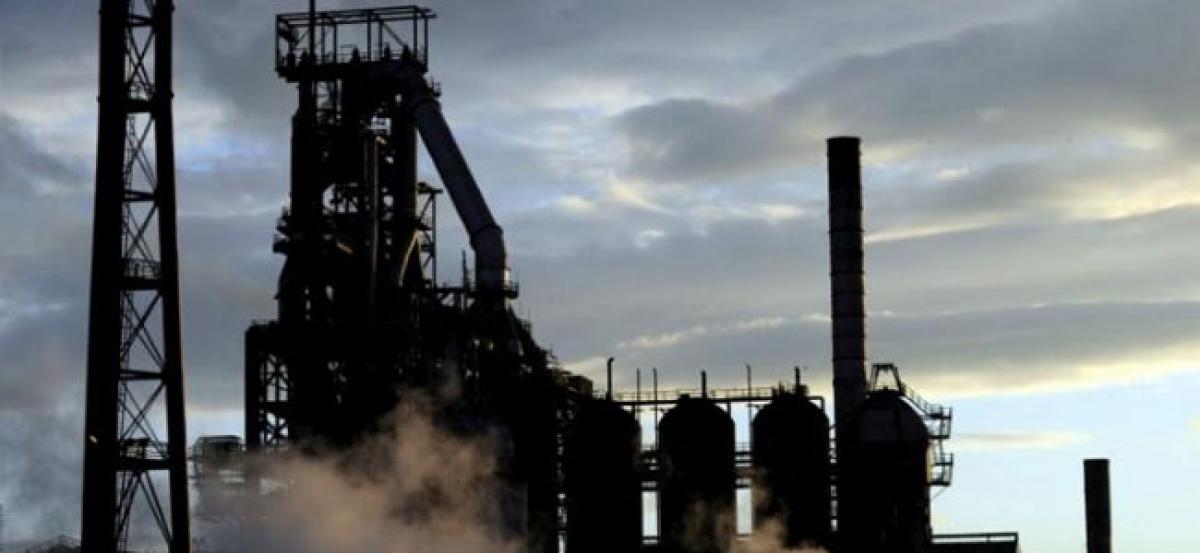Live
- First Impressions and Unboxing of the MacBook Pro M4: A Powerhouse for Professionals and Creators
- China Gears Up for Potential Trade War Amid Trump’s Tariff Threats
- Small Farmers Gain Less by Selling to Supermarkets: Study Reveals
- Why Despite the Controversy, America Is Anticipating the Mike Tyson vs. Jake Paul Fight
- Sanju Samson and Tilak Varma Shine: Record-Breaking Feats in 4th T20I Against South Africa
- India Urges $1.3 Trillion Annual Climate Support for Developing Nations
- Bad air: 106 shuttle buses, 60 extra Metro trips planned to make Delhiites give up cars
- WHO reports declining monkeypox cases in Congo
- CM Attends Kotideepotsavam on Kartika Purnima
- PKL Season 11: Raiding trio of Devank, Ayan, Sandeep help Patna Pirates rout Bengal Warriorz
Just In

Tata Steel UK (TISC.NS) offered British unions a deal guaranteeing jobs and investment on Wednesday in return for pension cuts, moving the company closer to merging its European assets with Germany\'s Thyssenkrupp (TKAG.DE).
LONDON: Tata Steel UK offered British unions a deal guaranteeing jobs and investment on Wednesday in return for pension cuts, moving the company closer to merging its European assets with Germany's Thyssenkrupp.
Britain's largest steelmaker offered to guarantee production at the country's largest steel plant in Port Talbot, Wales, for five years, and to invest across its British business, subject to the business achieving financial targets.
British unions said Tata had offered to invest 1 billion pounds ($1.26 billion) in its UK business over the next decade, and had committed to try to avoid any compulsory redundancies for five years.
Tata said it would support employees until 2021 by 'investing in their skills' but in return it was looking to change employment terms and close the deficit-laden final salary pension scheme to future accrual.
Tata, which employs some 4,000 people at Port Talbot and 11,000 in Britain as a whole, will start formal pensions consultations next week, with a view to moving employees on to a less generous defined contribution scheme.
Unions said in a statement they will ballot on the plan in January.
They are concerned that if they agree to let Tata close the current British Steel Pension Scheme (BSPS), the company will look to spin it off into a standalone entity that could eventually fall into the Pension Protection Fund (PPF) if necessary.
The PPF is a life-boat for failing schemes that would cut benefits by 10 percent for employees below retirement age.
The BSPS trustee board said in a statement it believes entry into the PPF remains the most likely outcome for the scheme, unless benefits are modified to eliminate the scheme's deficit.
"There is much more work to be done to make Tata Steel UK more financially sustainable," said Koushik Chatterjee, Tata Steel Europe's executive director, in a statement.
"The proposed changes to future pension provision and other employment terms are necessary to de-risk the company and help achieve long-term sustainability. We are also working separately on a necessary structural solution for the BSPS fund."
Unions said they remain concerned about Tata's pensions plans, even though it is now offering to contribute up to 10 percent to a new defined contributions pension scheme, versus a previous offer of 3 percent.
They are also concerned about the longer term aim behind Tata and Thyssenkrupp's merger plan.
Thyssenkrupp, which has insisted it is not prepared to take on Tata's pension liabilities, has made clear its main goal in merging with Tata is to combat overcapacity in the steel sector.
A source close to Thyssenkrupp's board told Reuters the company expects to cut capacity at Port Talbot in the event of a merger. He did not specify by how much or by when.
Port Talbot was losing 1 million pounds a day in the financial year ended March but has been making an operating profit since then, thanks to sterling's weakness, higher steel prices and cost-cutting.
The BSPS is one of Britain's largest defined benefit schemes with over 130,000 members.
Tata inherited the scheme when it bought Corus in 2007. The business has posted consistent losses since then and Tata has been forced to write down well over a billion pounds worth of assets as a result.

© 2024 Hyderabad Media House Limited/The Hans India. All rights reserved. Powered by hocalwire.com







